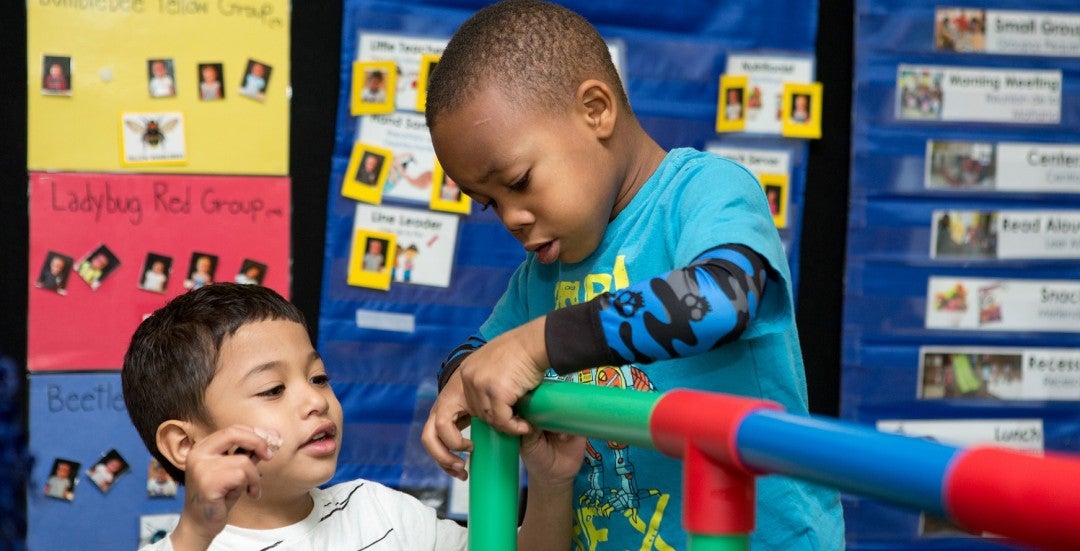This is a promising trend because, as a new study from the Kinder Institute for Urban Research shows, pre-K provides a vital boost to young learners, positioning them for academic success. The benefits are especially meaningful for the many emergent bilingual students in the region.
Children’s brains develop rapidly during the first five years of life, laying the groundwork for future learning and wellbeing. By age 5, 90% of a child’s brain has developed and new neural connections are forming at a rate of 1 million per second, faster than any other point in the lifespan. This early phase of high brain plasticity is a critical time for learning language, emotional regulation, and social skills — abilities that shape all aspects of life. Early interventions like public pre-K tap into this heightened plasticity, amplifying the impact of education and positive, structured social interactions.
Expanding access to the benefits of public pre-K is more crucial than ever, as the COVID-19 pandemic exacerbated the challenges faced by low-income and minority children. High-quality public pre-K can help reduce these disparities. Our most recent research finds that children who attend public pre-K have positive academic outcomes early in elementary, helping to create a more level playing field as children continue in school.
Kindergarten readiness
Kindergarten readiness is the level of development in the skills, knowledge, and behaviors that prepare children for their experiences in kindergarten. The more prepared a child is upon their entry to kindergarten, the stronger foundation they have for future academic success.
Our research found that students who attended public pre-K in the Houston region were more likely to be ready for kindergarten than those who did not attend public pre-K (but likely would have qualified). This finding is aligned with other research from schools across the country that consistently shows children who attend pre-K are more prepared for kindergarten. This benefit is important because students who start kindergarten ready to learn demonstrate better academic performance over time. In particular, early literacy and math skills predict future academic success.
Chronic absenteeism
Attending pre-K not only prepares children academically for kindergarten but also increases their likelihood of being present and ready to learn in the classroom. Our research in the Houston area found that students who attended public pre-K were less likely to be chronically absent (missing 10% or more of school days) in both kindergarten and first grade compared to peers who did not attend but would have qualified.
Students who frequently miss school tend to score lower in math and reading, participate less actively in the classroom, and struggle to build strong social connections. The negative impacts of chronic absenteeism are twice as large for students from low-income families. Early chronic absenteeism often predicts absenteeism in later grades, making it essential to disrupt this cycle as early as possible. Public pre-K provides an early boost that can help set a pattern of consistent attendance, supporting stronger long-term academic and social outcomes.
English proficiency
According to the Texas Education Agency, over 320,000 emergent bilingual students were enrolled in Houston-area public schools in 2023-24. For these students, being reclassified as English proficient is an important milestone that opens new academic opportunities in later grades, including advanced coursework and greater access to college-preparatory paths.
To be reclassified as English proficient, emergent bilingual students must achieve a certain score on an English proficiency exam, demonstrating they no longer need language support to participate in English-only instruction. Our research shows that emergent bilingual students in the Houston area who attended public pre-K scored slightly higher on English proficiency exams in kindergarten and first grade than those who did not attend but likely would have qualified.
Previous research found that students who reclassify as English proficient in elementary school often outperform their peers who were never classified as emergent bilinguals. However, students who remain classified as emergent bilinguals into middle and high school are at a greater risk of academic challenges, including a higher likelihood of dropping out and more limited access to college. By supporting early English language development, public pre-K increases the chances of reclassification, helping set students on a stronger path toward long-term academic success.
Conclusion
In Houston, our study found important benefits of public pre-K that align with extensive research on pre-K’s positive impacts. Beyond preparing children for kindergarten, pre-K contributes to long-term outcomes like improved third-grade literacy and greater high school graduation rates. These benefits extend into adulthood; children who attend high-quality early education earn higher incomes and even experience better health outcomes, such as a lower risk of heart disease.
Investing in early childhood education pays off significantly — every dollar spent yields an estimated $7-12 return to society through improved education, health, and economic productivity. Expanding enrollment, improving attendance, and enhancing program quality in pre-K should be top priorities for school districts and the state. Strengthening these efforts can help ensure that more of Houston’s children have the foundation they need to succeed.


